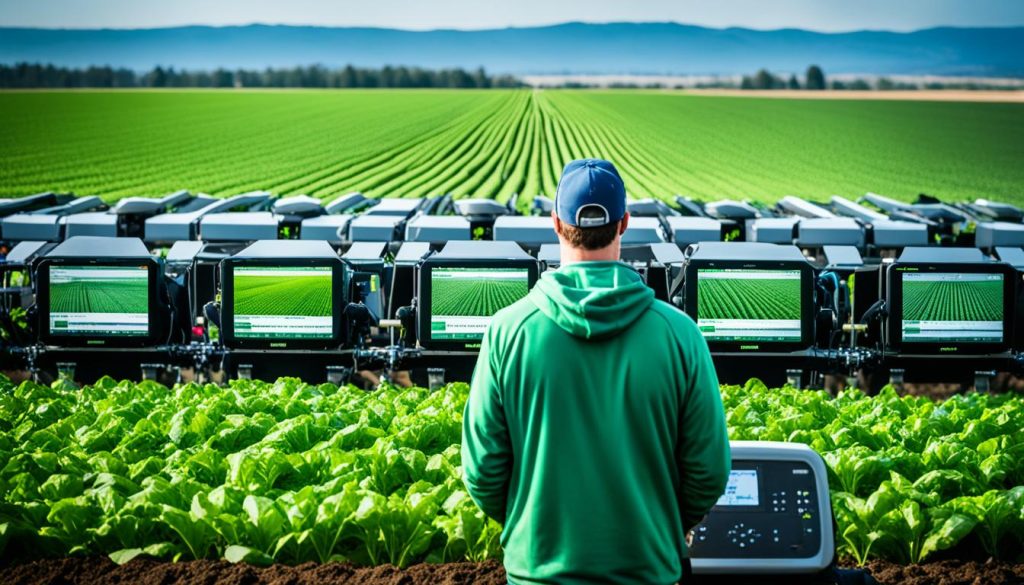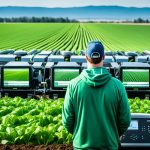In recent times, the Czech agribusiness has seen major progress. This is thanks to new technologies and a push for sustainability. The country is changing how it farms. It now focuses on better efficiency and production through innovation. All the while, it keeps the environment in mind. This shift is boosting the Czech economy. It’s also making a mark on sustainable agriculture in Europe.
Key Takeaways
- Technological advancements are vital to the growth of Czech agribusiness.
- Sustainable farming practices are improving ecological impact.
- Czech innovations set a high standard for European agriculture.
- Efficiency in farming enhances economic benefits.
- Commitment to environmentally friendly methods is a priority.
Introduction to Czech Agribusiness
The Czech Republic’s agriculture is vital to its economy. It combines historical knowledge with modern techniques. This sector grows a wide variety of products, like cereals, root crops, and many fruits and vegetables.
Agriculture has always shaped Czechia’s social and economic development. It has moved from old farming methods to high-tech agribusiness. This change has made Czech farming more productive and competitive in Europe.
In the Czech Republic, farming involves both small and large-scale operations. This mix allows for a wide range of produce. It satisfies local needs and the demands of international markets. Community farming adds to this strength, supporting Czech agribusiness.
Farming in Czechia produces essentials like wheat, barley, and maize. It also excels in dairy and livestock. The country’s rich soil is perfect for varied farming activities. It helps the rural economy stay strong and grow.
Its location in Europe gives Czech agribusiness a big trading advantage. Easy access to large markets helps. It also uses advanced farming techniques. This puts Czechia’s agriculture in a strong position for the future.
The agricultural sector in Czechia is a model of resilience and innovation. It focuses on sustainable methods and using technology. This balance between old and new makes Czech agribusiness vital for the economy at home and in Europe.
The Role of Technology in Czech Farming
Technology is changing Czech farming for the better. Farmers use new tools thanks to Czech agricultural tech. These tools boost productivity and are good for the earth.
Precision Agriculture
Precision farming is key in Czech agricultural tech. It allows farmers to closely monitor their fields. Using GPS and IoT devices, they check soil and crop growth. This leads to less waste and more food.
Smart Farming Equipment
Smart farming tools like drones and self-driving tractors are making a big difference. Drones take pictures to check on crop health. Self-driving tractors plant and harvest with great precision. This cuts down on costs and makes farms more efficient.
Data-Driven Decision Making
Data analysis is vital for Czech farmers. They use data from sensors and weather reports. This helps them predict how well their crops will do. They manage their land better and reduce risks. Using data helps farms work smarter and protects the environment.
Using new technology, Czech farming is entering an exciting phase. Smart tools and data are making farms more productive and green. Czech farmers are ready for the future, using tech to grow more with less.
Government Policies and Support
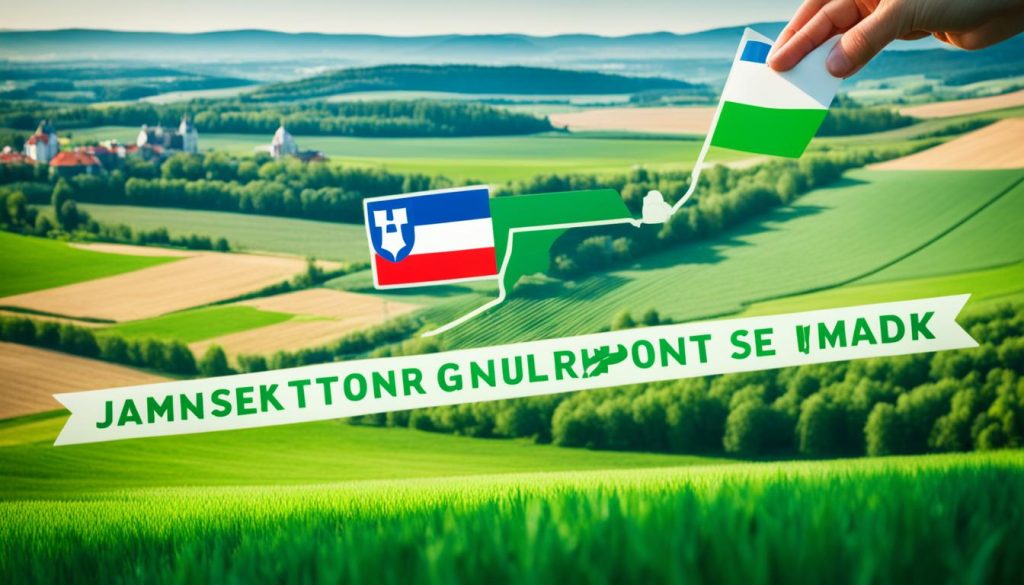
In the Czech Republic, the agricultural policy supports the agribusiness sector with various initiatives. The government offers agribusiness subsidies to make farming more competitive and sustainable. These subsidies enable farmers to buy modern technology and try new farming methods.
The government focuses heavily on research and development in agriculture. It funds projects that explore advanced agricultural technologies and techniques. This push for innovation helps make farming more efficient and eco-friendly. It’s crucial for the agribusiness sector’s future.
The Czech Republic is also committed to improving life in rural areas. It has a rural development strategy that includes bettering infrastructure, education, and healthcare. The strategy aims to create jobs and prevent people from leaving rural areas. It makes agriculture an appealing career choice.
Additionally, the rural development strategy helps small and medium-sized agricultural businesses. It offers them subsidies to upgrade their operations, get new equipment, and adopt new farming techniques. This help makes the agricultural industry more varied and strong.
| Government Initiative | Key Features | Impact on Agribusiness |
|---|---|---|
| Agribusiness Subsidies | Financial aid for advanced technology and innovation | Enhanced competitiveness and sustainability |
| Research and Development Programmes | Funding for innovative agricultural technologies | Shift towards efficient and eco-friendly practices |
| Rural Development Strategy | Infrastructure, education, healthcare improvements | Improved quality of life, job creation, reduced depopulation |
Innovative Farming Techniques in Czech Republic
In Czech Republic, innovative farming is changing the game. Modern techniques like hydroponics, aeroponics, and organic farming are key. They’re leading to a greener, more sustainable future in farming.
Hydroponics
Hydroponics is farming without soil and it’s catching on. Plants grow in water enriched with nutrients, which boosts their growth. It’s good for the planet too, using less water.
Aeroponics
Aeroponics takes plants and suspends them in air, feeding them through a nutrient-rich mist. It’s a fast way to grow plants, saving water in the process. It’s a smart choice for sustainable farming.
Organic Farming
People in Czech Republic want more organic food now. They know it’s better for their health and the planet. Organic farms don’t use harmful chemicals, supporting nature and all its life.
Czech Agribusiness is Embracing Innovation
The Czech agribusiness is moving forward. It’s now focusing on new, innovative ways of farming. Many are using modern methods and top-notch technologies. This change is making farms more efficient and productive.
Technological progress is making a big difference in farming here. Tools for precision farming, automated machines, and data analysis are reshaping how farmers work. These advances encourage Czech farmers to think ahead.
Smart farming tools are a key innovation. These include tractors that use GPS and drones to check on crops. Such technologies lead to better accuracy. They also help use resources wisely, cutting costs and boosting crop yields.
Data now plays a big part in farming decisions. Thanks to data analytics, farmers can choose better ways to manage crops. They can predict how well crops will do and deal with weather risks.
More and more Czech farms are trying out these new technologies. They’re finding ways to blend them with traditional farming. This shift is not just making farms work better. It’s also encouraging farming that’s good for the planet.
This move towards new farming methods shows the Czech Republic’s commitment to innovation. With ongoing investments and a readiness to try new things, the Czech Republic is leading in agricultural tech.
Case Studies of Successful Innovative Farms
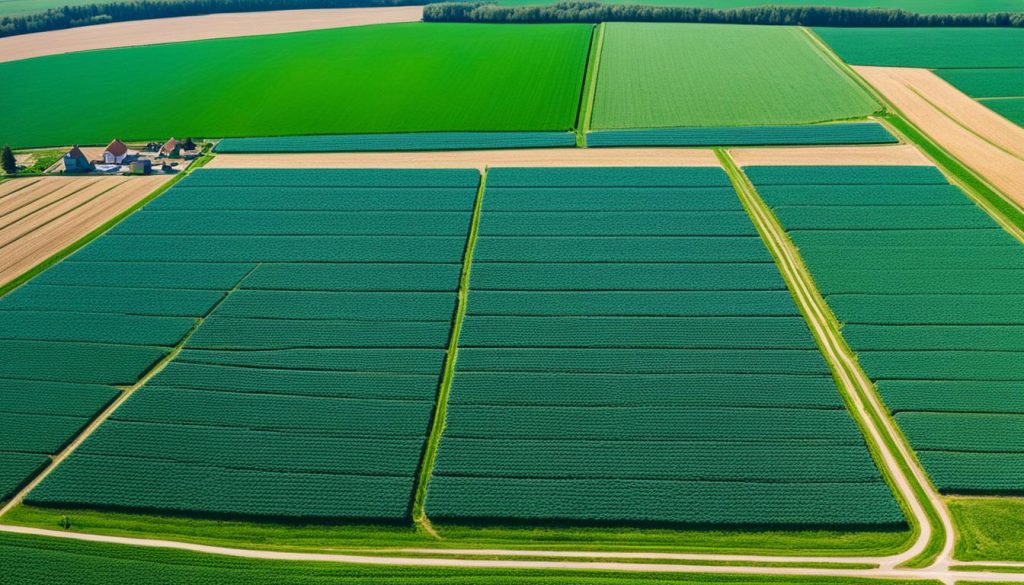
Exploring Czech farm success stories shows how innovation is changing agribusiness in the Czech Republic. Below, you’ll find fascinating examples of agricultural innovation. These case studies reveal the vast progress made by pioneering farms.
AgroVation is a farm using high-tech solutions like drones and satellite imagery. These tools help monitor crops and manage water better. Thanks to this, they’ve improved productivity and saved water.
Biofarm Sasov is leading the way in sustainable organic farming. They use eco-friendly methods and composting techniques. This has boosted soil health and cut down on chemicals, making them a leader in sustainability.
Rhea Holding has turned to precision agriculture to get more from their land. They use GPS-guided machinery and precise farming methods. This has increased their crop yield and cut down on waste, showing the real benefits of farming technology.
These successful farm case studies prove the power and potential of Czech agriculture. By embracing tech and sustainable methods, these farms are creating new standards for agricultural innovation.
| Farm | Innovative Method | Outcome |
|---|---|---|
| AgroVation | Drones and Satellite Imagery | Increased Productivity and Water Conservation |
| Biofarm Sasov | Organic Farming and Advanced Composting | Improved Soil Fertility, Reduced Chemicals |
| Rhea Holding | Precision Agriculture | Higher Yields, Reduced Waste |
The achievements of these farms inspire others, showing that agricultural innovation is key to sustainability and efficiency. Czech farm success stories demonstrate a bright future for agribusiness. Thanks to ongoing progress and innovative practices, these farms shine brightly in agricultural innovation.
The Impact of Climate Change on Czech Farming
Climate change is reshaping Czech farming in big ways. It’s forcing farmers to change age-old methods and come up with new ones. Now they face more droughts and floods, which mess up their crops and their way of life.
Droughts are a big worry for them. They don’t have enough water, pushing them to find smart ways to use what they’ve got. They’re now using less water, setting up better irrigation, and growing crops that don’t need as much water.
Switching up the crops they grow is another smart move. This helps keep the soil healthy, fights pests, and makes farms stronger. Healthier soil holds water better and helps plants deal with the weather.
Efforts to fight climate change’s bad effects are picking up speed. We’re seeing more trees being planted, and cover crops stopping soil from washing away. Farms are also trying out natural farming to take better care of the land. These steps are key to keeping farming going strong, even when the weather changes.
Here’s a quick look at old versus new farming ways:
| Parameter | Traditional Methods | Innovative Strategies |
|---|---|---|
| Water Management | Basic Irrigation | Advanced Irrigation Systems, Efficient Water Use |
| Crop Variety | Standard Crop Types | Drought-Resistant Varieties |
| Soil Health | Conventional Fertilisation | Crop Rotation, Organic Practices |
| Erosion Control | Minimal Preventative Measures | Cover Crops, Reforestation Projects |
In summary, tackling climate change in Czech farming is a big job. It needs fresh ideas as well as traditional know-how. By working together, they can keep farming alive for the future.
Education and Research in Agribusiness
The role of education and research in agribusiness in the Czech Republic is crucial. Education bodies and research institutions are driving the agribusiness sector forward. They ensure that agri-science leads the way in agricultural progress throughout the country.
Agricultural Universities
Agricultural universities in the Czech Republic are key to agribusiness education. They have programs that deal with everything from traditional farming to the latest in agri-science. These places teach students to think critically, innovate, and gain practical skills.
Students are prepared to meet future agribusiness challenges head-on. This makes them ready for tomorrow’s world.
- Mendel University in Brno
- Czech University of Life Sciences Prague
- University of South Bohemia
Universities work with industry leaders to improve agricultural methods. Through education, students don’t just learn; they also help in major research projects.
Research Institutions
Research bodies are central to agricultural studies in the Czech Republic. They work on improving crops, soil health, pest management, and farming sustainably. Their work boosts productivity and supports sustainable agribusiness.
| Institution | Focus Area | Contribution |
|---|---|---|
| Crop Research Institute | Crop Improvement | Developing high-yield and disease-resistant varieties |
| Research Institute for Soil and Water Conservation | Soil and Water Management | Innovative soil conservation practices and efficient water use |
| Institute of Agricultural Economics and Information | Economics and Policy | Analysing and providing insights for agricultural policy-making |
Thanks to the efforts of universities and research bodies, the Czech Republic is advancing in agribusiness. The focus on research and education is powering innovation. This commitment is building a strong and sustainable agribusiness sector.
Sustainable Practices in Czech Agribusiness
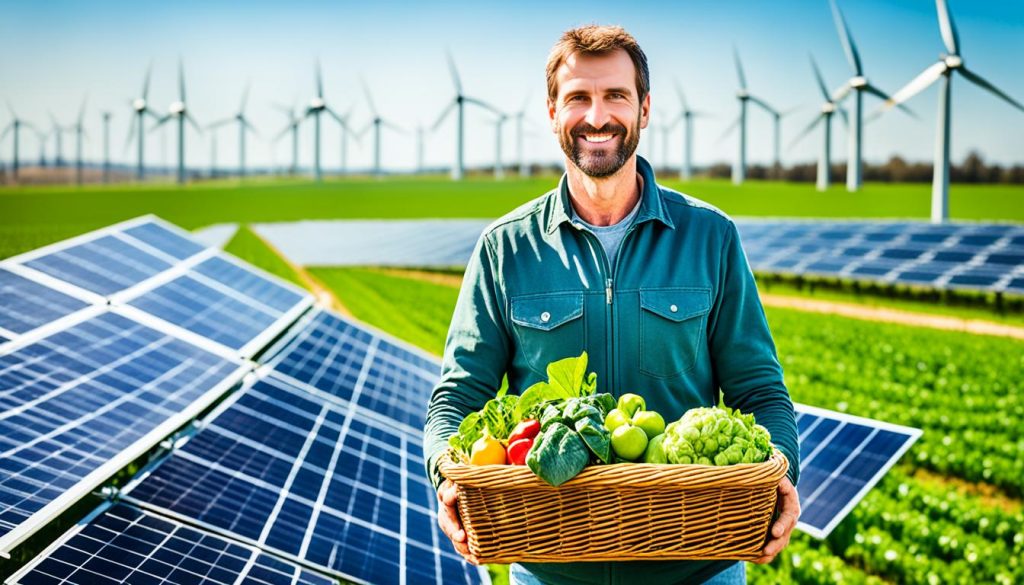
Czech agribusiness is leading with innovative sustainable farming. Its main aim is to care for ecological balance and protect the environment. This includes using eco-friendly methods that manage natural resources wisely.
Water management is crucial, using drip irrigation systems for efficiency. Also, cutting down on chemicals is important. This is done by turning to integrated pest management systems.
Reducing organic waste is another key effort. Composting turns agricultural waste into useful fertilisers, enhancing nutrient cycles. Crop rotation and cover cropping help keep the soil healthy and fertile.
Such sustainable methods are both good for the environment and the economy. They ensure the long-term success of Czech farmers. These practices show the way for agribusiness worldwide.
| Sustainable Practice | Environmental Benefit |
|---|---|
| Drip Irrigation | Efficient Water Usage |
| Integrated Pest Management | Reduced Chemical Dependency |
| Composting | Organic Waste Reduction |
| Crop Rotation | Soil Fertility Maintenance |
Czech agribusiness is truly committed to better agriculture. It’s all about being kind to the environment while producing food sustainably.
Challenges Facing Czech Agribusiness
The Czech agribusiness sector is grappling with many hurdles. Among these, economic pressures stand out. They come from changing market prices and soaring operational costs. As a result, Czech farms find it tough to stay competitive.
There’s a growing concern over the aging workforce in the industry. Most farmers are nearing retirement, with not enough young people taking their place. This could lead to a lack of skilled workers, further straining the sector.
Dealing with land ownership is another big challenge. Farms often face fragmented land parcels and tough property laws. These issues hamper growth by limiting expansion and modernisation opportunities.
Czech farmers are also up against tough competition from abroad. Imported agricultural products often outcompete local goods in price and quality. This situation makes it difficult for domestic agribusinesses to expand their market presence.
To tackle these challenges, Czech farmers are exploring new paths. They’re turning to technology and diversifying their crops. Additionally, they’re getting support from government subsidies and initiatives to attract the youth. These steps are vital for the sector’s future success.
| Challenges | Impact | Strategic Responses |
|---|---|---|
| Economic Pressures | Reduced Profitability | Technological Integration |
| Ageing Workforce | Labour Shortages | Educational Programmes |
| Land Ownership Constraints | Limited Expansion | Policy Reforms |
| Market Competition | Stifled Growth | Government Subsidies |
Emerging Trends in Czech Farming
Czech farms are now embracing broader European agricultural standards. Several key trends are making a big difference. Diversification is one such trend, helping farms stay economically stable. It means growing different crops and raising various livestock to beat market ups and downs.
Vertical farming is becoming very popular due to the lack of farming land. It allows farmers in cities to grow more by building upwards. This technique is a great example of how Czech farmers are innovating to be more efficient and eco-friendly.
Agro-tourism is growing and helps the economy and rural areas. Farms become attractions, bringing in visitors and money while teaching about farming’s past.
Precision livestock farming is another innovative trend. It uses the latest technology to keep a close watch on animal health and well-being. This method boosts productivity and supports ethical farming, which is becoming more important.
Here is a brief look at these trends:
| Trend | Description |
|---|---|
| Diversification | Adding different crops and animals to reduce economic risks. |
| Vertical Farming | Making the most of limited space by growing crops vertically, particularly in cities. |
| Agro-tourism | Turning working farms into tourist spots for extra income and rural development. |
| Precision Livestock Farming | Employing the latest tech to watch over and care for livestock’s health and welfare better. |
These new trends show Czech agriculture is changing in exciting ways. Embracing new farming methods means Czech farmers are ready for future challenges. They’re working towards a strong and lasting agricultural future.$>
The Future of Czech Agribusiness
The future of Czech agribusiness is gearing up for big changes. It’s on the edge of entering a new, exciting phase. This change comes with new tech and shifts in the world’s trade patterns. Czech agriculture is ready to transform.
Upcoming Technologies
Soon, Czech farmers will use more artificial intelligence, robotics, and genetic engineering. These tools will make farming more productive, efficient, and green. They’ll help farmers know exactly what their crops need. This means less waste and better use of resources.
Robotics will take over hard jobs like planting and gathering crops, cutting costs. And genetic engineering will make crops that withstand pests, diseases, and the weather. That’s key for feeding more people while caring for our planet. So, Czech agriculture must adopt these technologies to stay competitive and eco-friendly.
Predicted Market Shifts
The market in Czech agribusiness is changing. More people want organic and local food because they care about health and the Earth. This means farmers need to use natural farming ways and be eco-friendly. They must match what people want.;p>Changes in global trade will also affect the sector. Food security and finding new markets will create chances for Czech agribusiness. It’s crucial to build better trade deals outside the EU and use new tech. Czech agriculture’s future is bright, with strong chances for innovation and growth.

